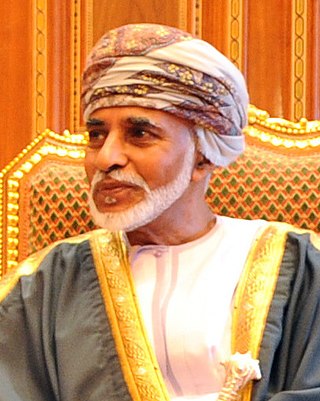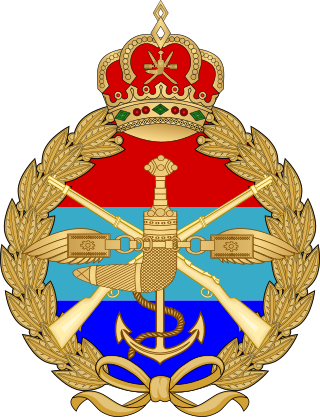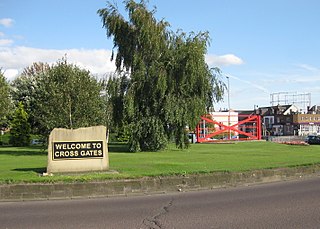
Oman, officially the Sultanate of Oman, is a country on the southeastern coast of the Arabian Peninsula in Western Asia. It overlooks the mouth of the Persian Gulf. It shares land borders with Saudi Arabia, the United Arab Emirates, and Yemen. The capital and largest city is Muscat. Oman has a population of about 5.28 million as of 2024 which is a 4.60% population increase from 2023. and is the 123rd most-populous country. The coast faces the Arabian Sea on the southeast, and the Gulf of Oman on the northeast. The Madha and Musandam exclaves are surrounded by United Arab Emirates on their land borders, with the Strait of Hormuz and the Gulf of Oman forming Musandam's coastal boundaries.

Qaboos bin Said Al Said was Sultan of Oman from 23 July 1970 until his death in 2020. A fifteenth-generation descendant of the founder of the House of Al Said, he was the longest-serving leader in the Middle East and Arab world at the time of his death, having ruled for almost half a century.

Manston Airport was a British airport. Originally operated as RAF Manston, from 1916, it has also operated as a commercial airport and was known as Kent International Airport and, briefly, London Manston Airport. It has been closed since 2014. Located in the parish of Minster-in-Thanet and partly adjacent to the village of Manston in the Thanet district of Kent, England, 11 NM north-east of Canterbury.
Royal Air Force Manston or more simply RAF Manston is a former Royal Air Force station located in the north-east of Kent, at grid reference TR334663 on the Isle of Thanet from 1916 until 1996. The site was split between a commercial airport Kent International Airport (KIA), since closed, and a continuing military use by the Defence Fire Training and Development Centre (DFTDC), following on from a long-standing training facility for RAF firefighters at the RAF Manston base.

Manston is a village and civil parish in the Thanet district of Kent, England. The village is situated one mile northwest of Ramsgate. The parish includes four hamlets and the former Manston Airport.

The Sultan of Oman's Armed Forces are the Royal Army of Oman, Royal Navy of Oman, Royal Air Force of Oman, Sultan's Special Force and other defense forces of the Sultanate of Oman. Since their formal establishment in the early 1950s, with British assistance SAF has twice overcome insurgencies which have threatened the integrity or social structure of the state, and more recently have contributed contingents or facilities to coalitions formed to protect Arab states of the Persian Gulf.

Cross Gates is a suburb in east Leeds, West Yorkshire, England.

The Sultanate of Muscat and Oman, also known briefly as the State of Muscat and Oman during the rule of Taimur bin Feisal, was a sovereign state that encompassed the present-day Sultanate of Oman and parts of present-day United Arab Emirates and Pakistan, in the second half of the 19th century and 20th century. Ruled by the Busaid dynasty, it was established as a result of the partition of the Omani Empire upon the death of its last ruler Said bin Sultan. The Sultanate transitioned into a new form of government after the palace coup of 23 July 1970 in which the sultan Said bin Taimur was immediately deposed in favor of his son Qaboos bin Said.

The Dhofar War took place from 1963 to 1976 in the province of Dhofar against the Sultanate of Muscat and Oman. The war began with the formation of the Dhofar Liberation Front, a Marxist group which aimed to create an independent state in Dhofar, free from the rule of the Omani Sultan Said bin Taimur. The rebels also held the broader goals of Arab nationalism which included ending British influence in the Persian Gulf region. Omani and British goals, on the other hand, were to safeguard Oman from communism and halt the spread of communist ideology as part of the broader Cold War.
Dame Ann Heron Gloag DBE is a Scottish businesswoman, activist, and charity campaigner. She is co-founder of the transport company Stagecoach Group.

The Royal Air Force of Oman is the air arm of the Armed Forces of Oman.

The Defence Fire Training and Development Centre was the site of the Ministry of Defence's firefighter training. It occupied part of a former Royal Air Force base near the village of Manston in the southeast corner of England. The remainder of the former RAF Manston was part of Kent International Airport, a civilian airfield, until the site was closed on the 15 May 2014.
The Basic Law, in accordance with tradition, declares that Islam is the state religion and that Shari'a is the source of legislation. It also prohibits discrimination based on religion and provides for the freedom to practice religious rites as long as doing so does not disrupt public order. The government generally respected this right, but within defined parameters that placed limitations on the right in practice. While the government continued to protect the free practice of religion in general, it formalized previously unwritten prohibitions on religious gatherings in locations other than government-approved houses of worship, and on non-Islamic institutions issuing publications within their communities, without prior approval from the Ministry of Endowments and Religious Affairs (MERA). There were no reports of societal abuses or discrimination based on religious belief or practice.

The following outline is provided as an overview of and topical guide to Oman:

Zanzibari cuisine reflects several heterogeneous influences, as a consequence of the multi-cultural and multi-ethnic nature of Zanzibar's and Swahili heritage. It is a mixture of various culinary traditions, including Bantu, Arab, Portuguese, Indian, British and even Chinese cuisine.
Internal Security Service is the national security agency of the Sultanate of Oman. The agency focuses solely upon domestic security while foreign intelligence operations is specifically handled by the Palace Office, which controls external security and coordinates all intelligence and security policies.

The Jebel Akhdar War, also known as the Jebel Akhdar Rebellion or the Oman War, broke out in 1954 and again in 1957 in Oman, as an effort by the local Omanis in the interior of Oman led by their elected Imam, Ghalib al-Hinai, to protect the Imamate of Oman from the occupation plans of Said bin Taimur, sultan of Muscat and Oman, backed by the British government, who were eager to gain access to the oil wells in the interior lands of Oman. Sultan Said received direct financing to raise an armed force to occupy the Imamate of Oman from Iraq Petroleum Company (IPC), a consortium of oil companies that was majorly owned by what is known today as Royal Dutch Shell, Total, ExxonMobil and British Petroleum (BP); the latter was majority-owned by the British government.
The Military ranks of Oman are the military insignia used by the Sultan of Oman's Armed Forces. Being a former British protectorate, Oman shares a rank structure similar to that of the United Kingdom.

Oman–Turkey relations are the foreign relations between Oman and Turkey. Turkey's historic relationship with Oman has wavered between friendly indifference and courtship, but mutual differences were set aside in 2002 when the new Turkish government embraced a policy of engagement with Oman.













